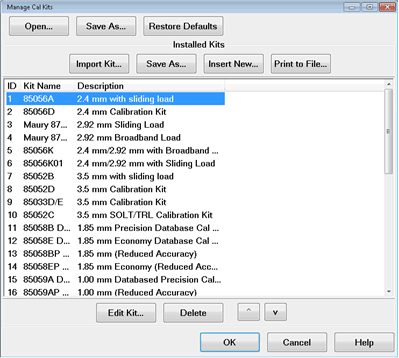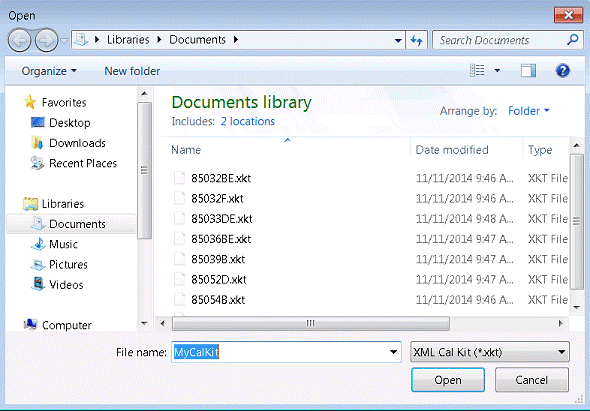Modify Calibration Kits
The following topics discuss Modifying Calibration Kits:
In this Topic
Using VNA CalKit Editor
Concepts
Procedures
Creating Custom Calibration Kits using a New Connector Family
Noise Figure and TRL Cal (separate topic)
The Manage Cal Kits dialog allows you to define the cal kits in the active workspace. These cal kits may be edited, created, or saved to a cal kit file.
Open Opens an archive of cal kits from past firmware upgrades and 'Save As' operations. Save As Saves ALL cal kits in the VNA to a *.wks file. Restore Defaults Re-installs the default factory contents of all Keysight cal kits from the VNA hard drive. The factory Keysight cal kits are stored on the hard drive at c:\users\public\network analyzer\PnaCalKits\factory. Installed KitsImport Kit Starts the Import Kit dialog box. Save As Saves the selected calibration kit and definitions (using .ckt file type). Insert New Starts a blank Edit Kit dialog box to create new calibration kit definitions. Print to File Prints the contents of the selected cal kit to a .prn file. Edit Kit... Starts the Connectors tab of the Edit Kit dialog box to modify selected calibration kit definitions. Delete Deletes selected calibration kit file. ^ Selects previous / next calibration kit in list.
|
Note: There is no limit to the number of cal kits that can be imported. However, during an Unguided cal, you can access ONLY mechanical cal kits #1 through 95. Imports a cal kit file into the active cal kit workspace. Files of type Select the file type of your Cal Kit. Learn more about VNA Cal Kit File Types File name Navigate and select your cal kit file name. Open Loads the selected file into the active cal kit workspace. Note: See Cal Kits and Firmware Upgrades Importing Cal Kits from "legacy" network analyzersCal kit files from "legacy" network analyzers (such as the 8510 or 8753) may not contain information that this VNA requires. Therefore, this VNA may modify the cal kit name, description, standards, and class assignments. You may need to correct these modifications after importing your legacy cal kit to meet your specific requirements.
|


